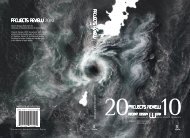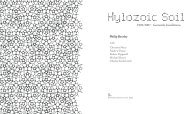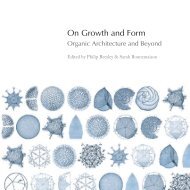The Inner Studio - Riverside Architectural Press
The Inner Studio - Riverside Architectural Press
The Inner Studio - Riverside Architectural Press
You also want an ePaper? Increase the reach of your titles
YUMPU automatically turns print PDFs into web optimized ePapers that Google loves.
THE INNER STUDIO<br />
Is it soulful?<br />
Is it related to my inspiration?<br />
What do I like most about the idea?<br />
This project needs more______?<br />
This project needs less_______?<br />
What are the questions you are aware of asking as you design?<br />
What questions would you add to this list?<br />
<strong>The</strong> question is also the rudder of our creative process–we will go<br />
in the direction set by it. To do this effectively, we need to address<br />
still another layer of the question: the emotional tone we establish<br />
inwardly when asking it. This is particularly essential when you<br />
consider that we often don’t ask a question consciously. We begin<br />
to sketch or draw as though the images were coming from somewhere<br />
else rather than from ourselves–albeit unconsciously.<br />
Including your heart’s desire in the formation of a question will<br />
help to ensure that the emotional tone of the question is positive<br />
and true. <strong>The</strong> simplest way to accomplish this is to take a moment<br />
to ask yourself about what you want–before addressing the project.<br />
When we consciously ask a question, we are committing to owning<br />
our intentions during the process of design.<br />
<strong>The</strong> question is an active ingredient. It’s job is to prompt or<br />
activate the unconscious. <strong>The</strong> question is a message sent from the<br />
conscious mind to the unconscious mind. <strong>The</strong> whole premise of<br />
design starts with an aspiration to produce something new. An<br />
original design presumes there is something unknown to be<br />
discovered. This unknown will come into being through the way<br />
you move through the creative process. If our question is too rigid,<br />
or too narrow, or too far from the present, then we will likely get<br />
back an answer that doesn’t help us. This is because we are resigning<br />
ourselves to a very limited relationship with the unknown. <strong>The</strong><br />
psyche is no more responsive to a flagrant act of will than to<br />
extreme dullness. In order to establish a relationship with the<br />
unknown, the question must be genuine. It will then fly into the<br />
unknown–powered not by will but by the heart’s desire for an<br />
answer–and lift our heart’s desire into the unknown.<br />
42





